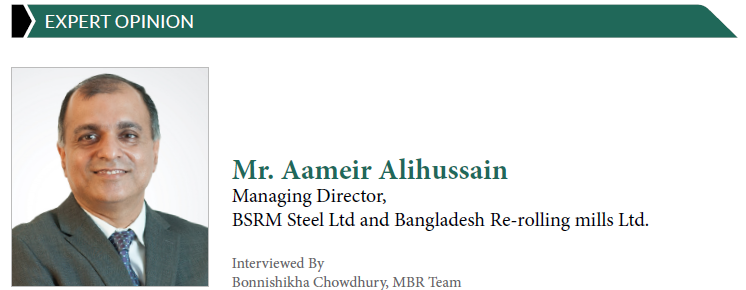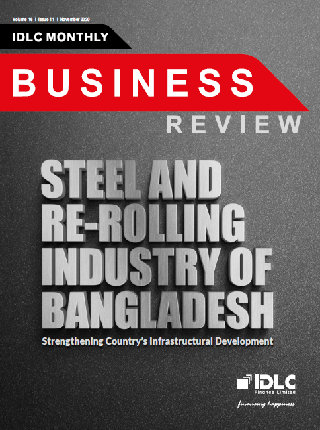
Mr. Aameir Alihussain,Managing Director, BSRM Steel Ltd and Bangladesh Re-rolling mills Ltd.
Bonnishikha Chowdhury, MBR Team
MBR: How do you see the impact of pandemic on the industry and how are you planning on overcoming the damages caused by this?
Mr. Aameir Alihussain: Pandemic caused supply, demand, procurement and financial shock to the economy. High uncertainty & short-live forecasts made the situation adverse for manufacturing industries. For overcoming the damage, we are planning with short term decisions by which we are preserving and creating value for long term for all our stakeholders. What was lost in in April to June quarter, will never come back but we are already trying to overcome the situation by being more efficient, cost effective adjusting faster to the changed market situation.
MBR: How do you see the contribution of your company in the growth process of the industry and what are the goals you want to achieve in future?
Mr. Aameir Alihussain: Consumption of steel has been rising for the last few years riding on the increasing gross domestic product (GDP) of the country and government spending on infrastructure. For supporting the economy, we are giving our fullest effort to satisfy the demand of the customer. Our goal is to improve consistently in terms of quality of products and services, efficiency of processes and profitability of our business. We are working on building our internal capability by improving our processes and optimizing our overheads and and hold our position of being the number one steel expert in the country. Throughout the steel industry history, we have tried to innovate and bring better products for the market and set new standards in the steel industry. This has always been the passion. Just recently we have launched a new, better product of steel rod called Xtreme 500 DWR which is a safer, better and tougher product than its predecessor Xtreme 500 CWR. For a long time, structural engineers were demanding a product which has better tensile to yield properties and we developed this product to perfection and launched it in the market. Most construction in the country will be using this product as it has better earthquake resistance properties. Over time the whole industry has grown in capacity alongside the growth in the country. The country should be proud of the steel industry, as the industry has always been able to support the growing local demand. And, Bangladesh never had to spend its valuable foreign exchange reserves on importing rods for construction.
MBR: What challenges do you think Bangladesh needs to overcome if we want to compete with the top producers like China?
Mr. Aameir Alihussain: In post pandemic era, whole world is amending its overdependence on China’s manufacturing and supply chains. The decentralization of manufacturing zones from China is showing a positive sign for developing countries like Bangladesh. Ensuring business friendly government policies, prompt support from government agencies, skilled manpower, justified interest rates, transportation, port facilities and encouraging private and foreign investment, reining in the soaring bad loans, turning around from the negative export growth are the key challenges Bangladesh needs to overcome to compete with the top producers like China. Government may take long term measures to compete with upcoming manufacturing zones in neighboring countries by making proper policy to attract private and foreign direct investment. Further Government also protect our industry by imposing high tax in case of import of steel products. Bangladesh needs to create an Ease of Doing Business index for domestic business environment and measure performance on this parameter.

The country has to be provided a better environment to reduce cost of production. Currently, the focus is only on labor intensive garment type industries where labor cost is the main cost and due to its nature being low and other policies facilitating that business, we have seen how successful it has become. Similarly, government has to think deeply on all other domestic industries how to make us more competitive. We have very high taxes locally, high logistics cost, high compliance costs, high financial costs, and high administration costs. Additionally, we have to invest more in projects in creating facilities to receive utilities, road connection etc compared to other countries which makes our investment higher compared to peer countries. We have a big disadvantage on freight cost in the country. Anything we bring in, costs us at least USD 20 per ton more than India and even Indian freight is high. We need to have excess port capacity to bring the freights down. Even import costs are high such as the requirement of LC confirmation. Millions of dollars go out of the country in the name of LC confirmation costs which is a big national loss and we would be thankful if the government could look into the matter of improving risk rating of the country as well as the banks. Banking sector needs to be working efficiently and with proper systems to improve their individual ratings.
MBR: As most of our productions are used to meet the domestic needs, what are the upcoming major development projects by government that might require a boost in steel production?
Mr. Aameir Alihussain: The government’s development projects have left a positive impact on the steel industry. At present, government projects account for 35 percent to 40 percent of the total steel consumption in Bangladesh, up from 15 percent a decade ago. Second Jamuna Bridge, Padma Bridge Rail Projects and Rooppur Nuclear Power Plant, MRT, Expressways, other PPP projects, 100 Economic Zones are the major development projects that might require boost in steel production.
MBR: In case of exporting, how do you see the potentiality of Bangladesh to play a significant role?
Mr. Aameir Alihussain: We have the potential to export steel, especially to the neighboring countries. Government should give cash incentive on export of only finished steel products at the rate of 10% on FOB price like other traditional and non-traditional goods. Additionally, the government should ensure refund of import duty and VAT quickly through an established system which currently is lacking in a big way. For a long time, no refunds are made which creates cash flow problem and higher financial cost. Also, the country needs to adopt to latest practices like digital country of origin or Safta certificates where signature verification issues don’t come up and export is smooth. As mentioned earlier, international freight and local taxes and other costs needs to come down for the country to be able to export to regional destinations.
MBR: What are the key reasons for drop in price of finished goods recently? Is it due to fall of raw material prices in the international market? If so, the raw materials of your inventory which were collected before pandemic might have cost high. How are you managing this situation?
Mr. Aameir Alihussain: Pandemic is the key reason for price drop as demand has been down and international prices for raw materials had also fallen. However, international prices are again increasing as world economy is recovering from the pandemic and therefore, local prices will increase in future. There is also excess capacity in the country currently and with GDP growth, eventually this excess capacity will reduce as demand will increase in future.
MBR: What kind of support does steel industry sought or expect from the government after this pandemic?
Mr. Aameir Alihussain: Looking at the proactive steps and activities showcased by our government authorities to curb the pandemic makes us optimistic. What I think he government can further look into is, they can create new policies which will reduce the cost of domestic businesses. However, during this pandemic Government sanctioned about Tk. 1.00 lac crore stimulus package for all industries at 4.5% interest plus immediate before pandemic Government ensured maximum interest at 9% for all kinds of loan which supports industrialization. Steel industry is struggling with the burden of high minimum income taxes which needs to be reduced. Additionally, there has been no refund so far on account of excess VAT being collected from the industry in terms of Advance tax at import stage and various deductions during the transaction process. Policy needs to be reviewed by the government to reduce the minimum income tax burden and also create a process of refund of income tax of previous years. Huge amount of money of the whole steel industry is stuck in refunds with the government and if it is refunded quickly and timely going forward, such money can have a huge multiplier effect on the economic growth which currently remains unutilized in government coffers.

STEEL & RE-ROLLING INDUSTRY OF BANGLADESH: STRENGTHENING COUNTRY’S INFRASTRUCTURAL DEVELOPMENT
Steel and Re-Rolling industry: fast paced recovery from pandemic on the cards
The Steel and Re-rolling industry, one of the prominent growth drivers of Bangladesh, has had its fair share of hit by the Covid-19 pandemic. This has been reflected on numbers as world crude steel production recorded a 3.2% decline compared to figures recorded in the same time period last year. As a developing nation with increased focus on to infrastructural development and lined up mega projects, Bangladesh sees massive growth potential in the Steel industry. With a market size of around BDT 450 billion the local Steel market employs nearly 1 (one) million people directly or indirectly across the country. The market has been growing at a rate of 15%- 20% for the past 2 years and contributes largely to the country’s GDP. However, the market for steel is turning into a perfectly competitive one from an oligopolistic structure as small players are now gaining efficiency and reaching competitive levels of their larger peers such as AKS, BSRM, KSRM etc. With the growth of the smaller companies, it is safe to say that the challenges that come with surviving in the Steel industry – such as, abundant supply of power and gas, availability of raw materials etc. are being well taken care of.
The Steel industry strategically runs on overcapacity. It is seen that the utilization is around 75% of total capacity which came down to 40% due to the pandemic wave. The prices of raw materials and finished goods are also seen to fall. However, as a resilient nation, Bangladesh is adapting fast to the new challenges that came with the pandemic. And, as we look towards a new normal, companies in the Steel industry must work in collaboration with regulators in order to sustain the growth and maintain the level of efficiency reached prior to the pandemic.
Sushmita Saha
Assistant Manager
IDLC Finance Limited